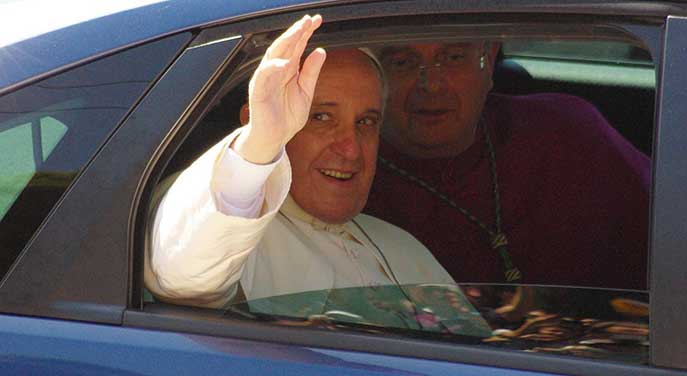 Self-development specialist Brian Tracy says, “People with clear, written goals accomplish far more in a shorter period of time than people without them could even imagine.”
Self-development specialist Brian Tracy says, “People with clear, written goals accomplish far more in a shorter period of time than people without them could even imagine.”
When I first read Call to Action 58 of the Truth and Reconciliation Commission report, I thought it was an unrealistic pipe dream. It called on the Pope to apologize for the role of the Catholic church in the abuse endured by Indigenous children at church-run residential schools and for the Pope to deliver this apology in Canada.
The hierarchy of the Roman Catholic Church is one of the most opaque and slow-moving boys’ clubs in the world. How could our Indigenous leaders expect them to listen?
Yet, armed with only a righteous cause and persistent determination, they managed to get Pope Francis to come to Canada. Francis travelled here, despite his deteriorating health, and apologized – at least somewhat.
Whether that apology should be accepted is a question that can only be answered by those of whom he’s asking forgiveness. Forgiveness is a very personal decision and telling a person they need to forgive does a further injustice to the person who has already been harmed. To some, the Pope’s apology meant a great deal; for others, it didn’t go nearly far enough.
Given the depth of the wounds, a Catholic church apology needs to go quite far. The world was watching Pope Francis’s visit to Canada and people were listening to every word he said because his church’s mistakes have been compounding for centuries. Several papal decrees (ironically, such a papal decree is called a “bull,” though it technically has nothing to do with the current slang term) from the 15th century stated that Europeans could enslave people and that they could take their lands away from them. We often refer to these as the Papal Bulls of Discovery or the Doctrine of Discovery. They were used as justification for colonization and the slave trade.
|
|||
|
In essence, these bulls resulted in a sick distortion of the message of Jesus, a Palestinian Jew who urged people to “spread the Good News to all the world.” Jesus meant to celebrate the infinite goodness in each child of God and the common humanity of all people. He was telling us to love each other. Instead, we ended up committing genocide, with victims all over the world.
What does all this mean to Canadians, to Christians and particularly to Catholics?
The message is very clear. Just as Pope Francis did, we need to embrace the 94 Calls to Action of the Truth and Reconciliation Commission and put them into practice in our daily lives. This can’t be overstated. We all need to work together to begin healing the deep wounds of colonialism in Canada and worldwide. Catholics in other countries would be remiss if they, too, didn’t follow the Pope’s example and embrace reconciliation toward the victims of the Doctrine of Discovery.
We must also continue to pressure Pope Francis and the Catholic hierarchy to somehow rescind the Papal Bulls of Discovery. This will have global implications, not only for the Catholic church but for every religious, political and economic institution that was guilty of any of the innumerable examples of cruelty and genocide that resulted and that continue to plague our world. We can’t turn back the clock, but we can address what’s wrong and make it right.
Not enough can be said about the Indigenous peoples of Canada. They set a seemingly unattainable goal yet found a way to make it happen. Their efforts have helped address the abuses their communities suffered and have moved us toward healing our broken world.
Gerry Chidiac specializes in languages, genocide studies and works with at-risk students. He is the recipient of an award from the Vancouver Holocaust Education Centre for excellence in teaching about the Holocaust.
For interview requests, click here.
The opinions expressed by our columnists and contributors are theirs alone and do not inherently or expressly reflect the views of our publication.
© Troy Media
Troy Media is an editorial content provider to media outlets and its own hosted community news outlets across Canada.


